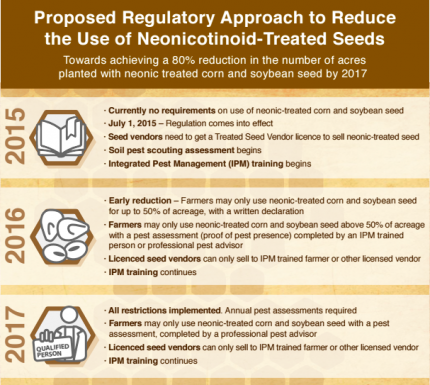Ontario to Set New Rules to Protect Pollinators
Posted: March 24, 2015
Categories: GoodFoodBites / News from Sustain Ontario
“Ontario is taking the strongest action in North America to protect bees, birds, butterflies, and other pollinators by proposing new rules that would reduce the number of acres planted with neonicotinoid-treated corn and soybean seeds by 80 per cent by 2017.” This recent announcement from the Ministry of Environment and Climate Change is great news for Ontario’s pollinators!
During winter 2014-2015, the Province released a discussion paper and undertook a public consultation on proposed changes to regulations that affect pollinator health. The consultation included tens of thousands of comments and emails, showing that Ontarians support immediate action to protect our food system and our pollinators. Sustain Ontario developed a template letter for its members and the public to send as part of the consultation process. For more details on Sustain Ontario’s perspective on the regulation proposal an the importance of Ontario’s pollinators, please see our previous post.
Pesticide exposure is one of the four main stressors faced by pollinators. A Pollinator Health Action Plan will help to protect these economically and environmentally important species. As a first step, the Province is proposing changes to the pesticide regulations that will include:
- a new class of pesticides consisting of corn and soybean seeds treated with the neonicotinoids, imidacloprid, clothianidin or thiamethoxam
- rules for the sale and use of treated seeds
- timing and implementation of the regulatory requirements
Go here to learn more about the proposed changes.
A comment period for the draft regulation is occurring now until May 7, 2015. If approved, the new rules will take effect July 1, 2015 in time for the 2016 growing season. Go to the Environmental Bill of Rights Registry to learn more about the draft regulation, and submit your comments online. You can also mail your comments to the address found here, or submit them by email to pollinatorhealth.ebr@ontario.ca.

